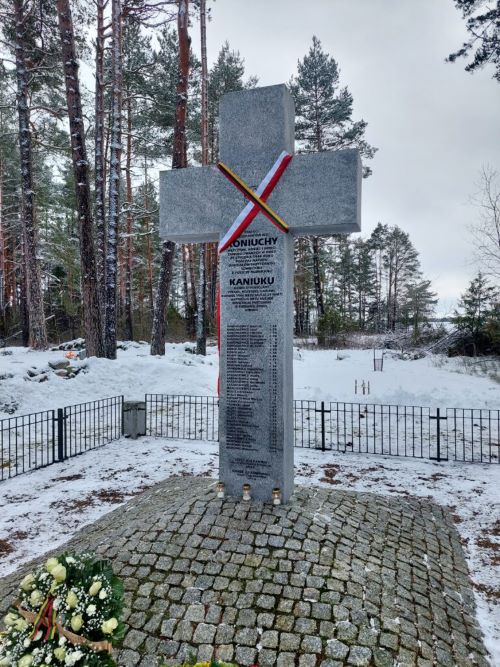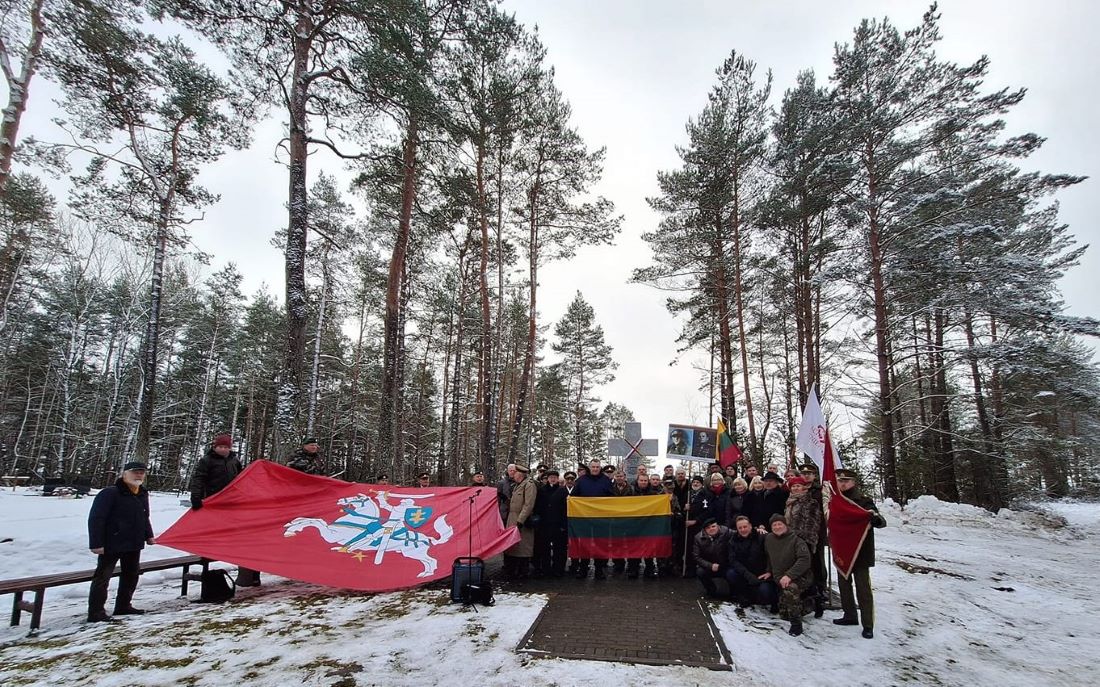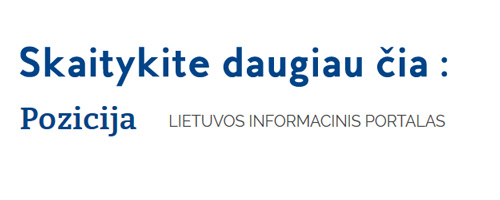
Rampage of the so-called Soviet partisans in the Nazi occupied south-east Lithuania in 1943 – 1944 has left bleeding wounds which are open to this day. For each act of terrorism perpetrated by these partisans, the Nazis executed hostages and punished entire villages. For the older generation of Lithuanians the names of villages: Fermos, Lazdenai, Dryzuliai, Miliunai, Lauciunai, Slapekiai and Pirciupiai are well known. Those farmers who failed to deliver the quota of food required by Germans were severely punished, some were even executed in Paneriai.
Attempting to defend themselves and their property from the armed gangs in the autumn of 1943 the villagers in some places began to form armed groups for self defense. For this they received acts of reprisals from the Communist terrorists. Until the years of revival people only dared to talk in whispers about the massive looting and executions committed by these pro-Soviet gangs.
When the archives were opened, people started to research the conflicts of South East Lithuanian self-defense groups with the pro-Soviet gangs. More detailed studies in this subject were published by Dr. Rimantas Zizas. In his opinion, in the history of the conflict between the armed self-defenders and the Cummunist gangs the crucial moment was the attack on Kaniukai village (Eišiškės district, Jašiūnai parish) on January 29, 1944. The attack on Kaniūkai and the murdering of the villagers was the most cruel act of reprisal which “became a real massacre /…/ a cruel crackdown on the people of village.”
In the Soviet-occupied Lithuania terrorists would not dare to mention their bloody crimes in their memoirs for fear of being lynched by the surviving relatives of their victims. Besides, they wanted to preserve the unblemished image of Soviet partisans. What’s more, some even talked not about murdering peaceful villagers in Kaniūkai but about defeating a Nazi garrison supposedly stationed there.
Many terrorists after the end of war fled to the West. Among them were people who openly wrote about the events of that winter without even thinking that these texts could ever reach Lithuania. The published memoirs help make a clearer picture about the “partisan warfare” of the red terrorists. These memoirs often are completely different from the scant data found in their files at Lithuanian special archive.

Memories of two of the terrorists Chaim Lazar and Abba Kovner about the massacre in Kaniūkai can be read on the internet at(https://alkas.lt/2021/01/30/i-tumaviciute-kaniuku-gyventoju-zudikams-negali-buti-senaties/)
We also managed to detect the memories of Paul Bagriansky, a former ghetto prisoner, published in the English language in Israel. From all the memoirs which we managed to read, Bagrianskys’ text was the only one which did not mention “a German garrison”. He did not feel revenge towards the simple villagers for the crimes of Nazi occupation. Maybe he thought about his daughter who was baptized by Bronė Budreikaitė as her fictional niece and given a name of Irena and about three other Lithuanian women who helped to save her life and were later included into the list of Righteous People of the World?
Paul Bagriansky, like a few other participants of Kaniūkai massacre, was ashamed that he had to take part in this grisly act, that many of his comrades-in-arms enjoyed murdering, desecrating the corpses, destroying everything and most of all – getting drunk.
The horrible scene described by Bagriansky about the desecration of bodies reminds one of the style of Communist criminals who after retreating from their former allies – the Nazis – massacred the Lithuanian martyrs in Rainiai as well as in Western Belarus and Western Ukraine.
We offer an excerpt from his memoirs published in 1988 [ Pirsumim (Tel Aviv: Publications of the Museum of the Combatants and Partisans), no. 65–66 (December 1988): p. 120–24].

When in April [January – I.T.] of 1944 our partisans were told that we are going teach a lesson to a village by the name of Koniuchi, I was not surprised. I knew the word but I had never heard about a village by the name of Koniuchi. Our Jewish unit of 25 men was put under command of Jacob Prener. Other units of mixed nationalities made up another 125 partisans. A total unit of 150 men, well equipped, represented an impressive force for us. In addition to our 25 men Jewish unit, we had Russians, Lithuanians, Polish, Ukrainians etc. under one commanding Russian officer who did not understand or speak any other language. It was assumed that everybody understood Russian but de facto it was far from true. Many Lithuanian and the younger Jews did not know Russian. Even Jacob Prener’s understanding of Russian was far from good.
Before we started, the commanding officer told us briefly in Russian what our mission was about. Many villages in the radius of about 20 kilometers from Koniuchi decided to bring their cows and hogs during the night to the village of Koniuchi. Koniuchi was well armed by the Nazis and soldiers from Armia Krajowa. Partisans who went for food to the surrounding villages would find them empty. Very often the Germans would come there overnight to protect the village of Koniuchi. Therefore, the commanding officer told us, we are going to teach Koniuchi a lesson. When we asked what kind of a lesson he had in mind, he said that we would know about it when the time came.
We marched from midday till the late evening and stopped in a village to rest and to eat. I was appointed by our commanding officer as interpreter and messenger between the various units. Despite the long and forced march, I was not tired and could not fall asleep.
It was a pity not to be able to sleep, because I knew that the next night we would have the action and I must be relaxed, alert and ready for any assignment. Then comes the third night of the march back to our base, the third night without sleep. This all in retrospect; at that time I did not think about „tomorrow”, and I did not much care whether 1 slept or not.
I spent an hoour or two in the headquarters where we studied the map with other officers, and being there I understood that our purpose is to destroy the entire village including all the villagers. I asked why such harsh inhuman treatment? The answer was that this is what the high command had decided to do. We cannot permit such heavy armed villages to disrupt our partisan activities. This lesson will teach the other villages to think twice before they try again with Nazi’s help to arm and to oppose us.

Next morning we started marching again till about 2 in the afternoon and then we stopped for „refreshments” and relaxation for 2 hours. It was a small pleasant village surrounded by high and old pine trees in the middle of a small part of a big forest. The fields were on one side of the forest and a small brook was rushing among the fields. The peasants offered us a very simple meal of eggs, white cheese, black bread and soured milk. Some peasants were curious to know where we were going. We told them that we were told to tell that we have to meet a big detachment of other partisans and to join them.
Around 4 o’clock we started moving again and we reached our destination close to 11 at night. A specific task and territory was assigned to each unit. At midnight everybody was in his place and waited for the sign to start the attack on the village Koniuchi. Some units had the task of setting the huts on fire while the others had to close the escape routes. Exactly at midnight the village was on fire and in a few minutes the stored ammunition started to explode.
The cows and hogs as well as horses that were in their stables started to make terrible noises. A few horses succeeded to escape and they were running like mad out of the burning village. The explosions from fire of all the thousands of German bullets that were held in each hut, the terrible noises of the burning animals and the shooting of the escaping villagers made such a hell of an uproar that no human cry or voice could be heard. The first hour I was standing with the commanding officer and few of his aides on a hill watching this awful inferno.
In the meantime I received an order to get in touch with my unit and to order them to take a new position. When I reached my unit I saw one of our people holding the head of a middle aged woman against a big stone and hitting her head with another stone. Each blow was accompanied by sentences like: this is for my murdered mother, this is for my killed father, this is for my dead brother, etc.
He was a young man of about 22 years old and I was with him all the time in the underground. He was a friendly and quiet person, I would never have expected to see him doing what he was doing now. What brought this sudden change? I did not react and told Jacob Prener what new position he should take and return to our commander. When I was back he ordered me to go to another unit to give them their new position. On my way I had to cross a „bolshak” (high road) that was surrounded’on both side by old trees. When crossing the road I saw a man escaping from the village.
Probably he saw me first and shot at me on the run, but missed. Realizing it, he stopped for a second to aim better with a second shot. But now I was ready and before he pulled his trigger, I pulled mine and the man’s gun fell from his hand. The man descended slowly to his knees and then streched out. He was dead. If 1 had crossed the road one minute earlier or one minute later we would probably have missed each other. He could still be alive today, as I am, if not for this one minute difference. Or vice versa, 1 would be gone if his first shot had been aimed at me more carefully.
When I reached the unit to tell them their new assignment, I saw an awful, gruesome picture. Even today, after more than forty years, it is hard to imagine or descibc what I saw. In a small clearing in the forest six bodies of women of various ages and two bodies of men were lying around in a half circle. All bodies were undressed and lying on their backs. The full moon was shining on them.
One man at a time was shooting in between the legs of the dead bodies. When the bullet would strike the nerve the body would react as if it were alive. It would shiver, quiver for a few seconds. The women’s bodies reacted much more violently than the dead bodies of men. All men of the unit were participating in this cruel play, laughing, in a wild frenzy. I was first petrified by this performance, and then started to be sickly interested. 1 had been standing fascinated for several minutes, when the unit commander approached me and asked if I would be interested to participate in these experiments. Only then I remembered why 1 was here, and told him what new position his men must take without further delay. They were not in a hurry, and only after the bodies ceased to react to the bullets, they moved to the new position.
The village by now was burning with big red flames, the explosions,still continued, as did the terrible howl of the burning animals. On mv way back to the command post I saw several bodies of the peasants who had been shot on their way to escape. A horse with a burning tail and mane was galloping full speed, probably to find some river or pond to ease the pain in the water. First I thought to shoot the horse to put it out of its misery. At the same time I remembered that horses know their way around and so he was galloping full speed to reach the water. I hoped he would make it in time.
Around two o’clock in the morning the village of Koniuchi was completely burned, not one hut was visible, no sound was forthcoming. Presumably all people, including the young, the women and the men were burned, shot with their own bullets exploding from the fire or finished by our men when trying to escape from this hell. Probably a few horses escaped and survived, if they made in time to the water. It is possible that a few people succeeded to escape and to stay alive in one way or another.

The village Koniuchi was now a memory full of ashes and of dead bodies. The lesson had been taught. The commanding officer assembled all units, thanked them for their well accomplished job, and ordered them to be ready to start to go back to our base. The people were tired but their faces looked satisfied and happy with the accomplished assignment. Only very few realized what a terrible murder had been committed within one hour. Those few looked dejected and downcast and felt guilty. Probably only those few still remember the village Koniuchi.
We reached our base late at night. I was tired and exhausted and went to sleep at once, as did most people of our unit. As we learned the next day, the other units got a heros’ welcome for destroying Koniuchi and they drank and ate and sang all night. They enjoyed the killings, the destruction and most of all the drinking.
Three weeks later there was a message from the Partisan Headquarters in Moscow to reprimand and punish the people that initiated and led the destruction of the village Koniuchi. Three months later we entered Vilnius with the Red Army.




